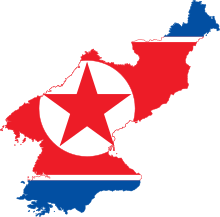Portal:North Korea
 The North Korea Portal The North Korea PortalIntroduction North Korea, officially the Democratic People's Republic of Korea (DPRK), is a country in East Asia. It constitutes the northern half of the Korean Peninsula and borders China and Russia to the north at the Yalu (Amnok) and Tumen rivers, and South Korea to the south at the Korean Demilitarized Zone. The country's western border is formed by the Yellow Sea, while its eastern border is defined by the Sea of Japan. North Korea, like its southern counterpart, claims to be the legitimate government of the entire peninsula and adjacent islands. Pyongyang is the capital and largest city. The Korean Peninsula was first inhabited as early as the Lower Paleolithic period. Its first kingdom was noted in Chinese records in the early 7th century BCE. Following the unification of the Three Kingdoms of Korea into Silla and Balhae in the late 7th century, Korea was ruled by the Goryeo dynasty (918–1392) and the Joseon dynasty (1392–1897). The succeeding Korean Empire (1897–1910) was annexed in 1910 into the Empire of Japan. In 1945, after the Japanese surrender at the end of World War II, Korea was divided into two zones along the 38th parallel, with the north occupied by the Soviet Union and the south occupied by the United States. In 1948, separate governments were formed in Korea: the socialist and Soviet-aligned Democratic People's Republic of Korea in the north, and the capitalist, Western-aligned Republic of Korea in the south. The Korean War began when North Korean forces invaded South Korea in 1950. In 1953, the Korean Armistice Agreement brought about a ceasefire and established a demilitarized zone (DMZ), but no formal peace treaty has ever been signed. Post-war North Korea benefited greatly from economic aid and expertise provided by other Eastern Bloc countries. However, Kim Il Sung, North Korea's first leader, promoted his personal philosophy of Juche as the state ideology. Pyongyang's international isolation sharply accelerated from the 1980s onwards as the Cold War came to an end. The fall of the Soviet Union in 1991 then brought about a sharp decline to the North Korean economy. From 1994 to 1998, North Korea suffered a famine with the population continuing to suffer from malnutrition. In 2024, the DPRK formally abandoned efforts to peacefully reunify Korea. North Korea is a totalitarian dictatorship with a comprehensive cult of personality around the Kim family. Amnesty International considers the country to have the worst human rights record in the world. Officially, North Korea is an "independent socialist state" which holds democratic elections; however, outside observers have described the elections as unfair, uncompetitive, and pre-determined, in a manner similar to elections in the Soviet Union. The Workers' Party of Korea is the ruling party of North Korea. According to Article 3 of the constitution, Kimilsungism–Kimjongilism is the official ideology of North Korea. The means of production are owned by the state through state-run enterprises and collectivized farms. Most services—such as healthcare, education, housing, and food production—are subsidized or state-funded. North Korea follows Songun, a "military first" policy which prioritizes the Korean People's Army in state affairs and the allocation of resources. It possesses nuclear weapons. Its active-duty army of 1.28 million soldiers is the fourth-largest in the world. In addition to being a member of the United Nations since 1991, North Korea is also a member of the Non-Aligned Movement, G77, and the ASEAN Regional Forum. (Full article...) Selected article -Kim Jong Un[a] (English: /ˌkɪm dʒɒŋˈʊn, -ˈuːn/; Korean: 김정은; born 8 January 1982, 1983 or 1984) is a North Korean politician who has been supreme leader of North Korea since 2011 and the leader of the Workers' Party of Korea (WPK) since 2012. He is the third son of Kim Jong Il, who was the second supreme leader of North Korea, and a grandson of Kim Il Sung, the founder and first supreme leader of the country. From late 2010, Kim was viewed as the successor to the North Korean leadership. Following his father's death in December 2011, state television announced Kim as the "Great Successor". Kim holds the titles of General Secretary of the Workers' Party of Korea and President of the State Affairs. He is also a member of the Presidium of the WPK Politburo, the highest decision-making body in the country. In July 2012, Kim was promoted to the highest rank of Marshal in the Korean People's Army, consolidating his position as Supreme Commander of the Armed Forces. North Korean state media often refer to him as "Respected Comrade Kim Jong Un" or "Marshal Kim Jong Un". He has promoted the policy of byungjin, similar to Kim Il Sung's policy from the 1960s, referring to the simultaneous development of both the economy and the country's nuclear weapons program. He has also revived the structures of the WPK, expanding the party's power in expense of the military leadership. Kim rules North Korea as a totalitarian state, and his leadership has followed the same cult of personality as his father and grandfather. In 2014, a United Nations Human Rights Council report suggested that Kim could be put on trial for crimes against humanity. According to reports, he has ordered the purge and execution of several North Korean officials including his uncle, Jang Song-thaek, in 2013. He is also widely believed to have ordered the assassination of his half-brother, Kim Jong Nam, in Malaysia in 2017. He has presided over an expansion of the consumer economy, construction projects and tourist attractions in North Korea. (Full article...)CategoriesRelated portalsCommunist countries in Asia Other countries North Korea in the news
Selected image -
Mansu Hill Grand Monument, Pyongyang
Did you know (auto-generated)
More did you know
General images -The following are images from various North Korea-related articles on Wikipedia.
North Korea topicsThings you can do
Associated WikimediaThe following Wikimedia Foundation sister projects provide more on this subject:
Web resources
Notes
Discover Wikipedia using portals |














































